RUSM Simulation Institute
The Ross University School of Medicine Simulation Institute provides a multifaceted and immersive learning environment, fostering the development of competent and compassionate physicians. Our emphasis on practical skills, patient-centered care, and immediate, constructive feedback equips you with the essential skills and experience to provide safe and effective patient care of the highest quality.
Mission
The mission of the Simulation Institute at Ross University School of Medicine (Ross Med) is to cultivate competent, caring, and reflective physicians using innovative medical simulation methodology.
Vision
Our vision is to be an institute of excellence that utilizes simulation to advance the training of competent physicians who are compassionate, self-reflective, ethical, and skilled in communication and patient-centered care.
Purpose
Reinforce basic science concepts through clinical applications.
Introduce students to aspects of the eight Accreditation Council for Graduate Medical Education (ACGME) competencies.
Incrementally develop clinical skills such as critical reasoning and medical decision-making.
Professionalism and self-development.
Interpersonal skills and utilize best practices in medical education supported by continuous improvement through ongoing research.care.
Simulation Center
The Ross Med Simulation Center’s advanced, high-fidelity simulation tools create a realistic environment for you to master skills and behaviors. Here, you can learn from mistakes without compromising the well-being of human patients. Develop and grow crucial clinical behaviors such as performing a history and physical exam, using appropriate interpersonal communication, and engaging in accurate clinical reasoning.
In Jan 2019, RUSM relocated its campus to Bridgetown, Barbados, following the disruptive impact to the school’s academic program from Hurricane Maria. Since the move, RUSMSI has maintained high-quality standards in infrastructure, equipment, human resources, curriculum development, and delivery tools. RUSM is transitioning to a single-track, single-module curriculum, scheduled for implementation in September 2023. RUSMSI has aligned its curriculum delivery with this initiative. The Ross University School of Medicine Simulation Institute (RUSMSI) has outlined the following short-term goals for 2023-2025:
The short-term goals are to:
- Achieve consistency in the student evaluation process to continuously improve program quality and responsiveness to students' needs. RUSMSI will conduct regular surveys at the end of each semester, allowing students to evaluate the course and provide feedback to the DCF Chair.
- Undertake regular case bank audits of existing Simulation cases and develop new cases when necessary to ensure they remain current with best practices and healthcare trends.
- Collaborating with the RUSM Office of External Affairs to identify and explore opportunities in Barbados for interprofessional student activities within the curriculum. This goal stems from the broader need for interprofessional education among healthcare team members to ensure patient-centered, high-quality medical care in line with the vision of US accreditation bodies, including SSH. Planned steps include:
- Ensuring that research and scholarship are pillars for the professional and personal development of DCF team members facilitating and/or delivering the Simulation curriculum and promoting best practice.
- Assigning a designated DCF Certified Healthcare Simulation Educator (CHSE) faculty member to research local healthcare training programs, such as nursing colleges or paramedic / Emergency Medical Services (EMS) training institutions interested in promoting and participating in interprofessional healthcare education.
- Upon identifying partner institutions, RUSMSI and the RUSM Curriculum Committee will collaborate with these institutions to develop an interprofessional education curriculum tailored to each program's learning objectives. Should any delays or obstacles arise, the Simulation Governing Committee will conduct a root cause analysis and determine the viability of the goal. Based on the committee's information and recommendations, the Department of Clinical Foundations Chair will decide whether to continue pursuing this goal.
Long-term goals for 2025-2028:
- Implement interprofessional education into the RUSM curriculum through simulation-based education within RUSMSI, building upon the project mentioned above if successfully established.
- Expand the simulation program by increasing the number of cases to create the context for and improve clinical reasoning across the basic science curriculum. The Simulation Director will collaborate with module directors and content experts from all disciplines, liaising with the DCF Chair and RUSM Curriculum Committee, which holds the final decision-making authority. To initiate a fellowship and a research program and seek accreditation from SSIH for Fellowship and Research.
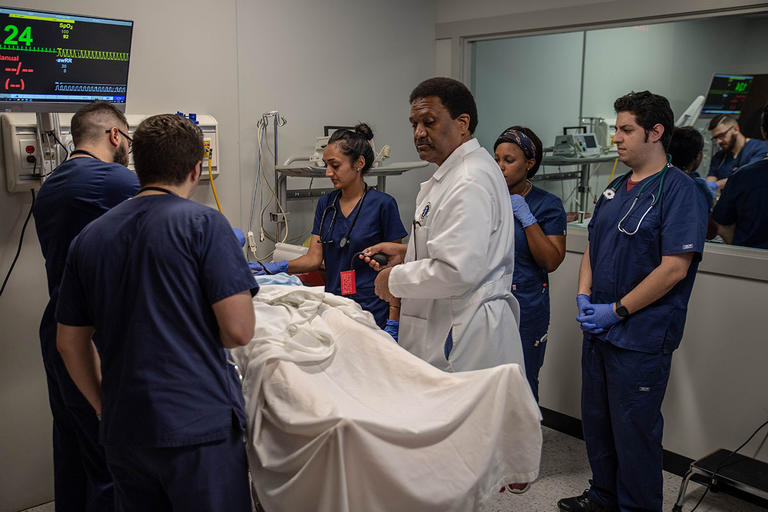
Simulation Center Includes:
- Advanced, high-fidelity simulation tools: The center includes Laerdal SimMan 3G and Harvey, the heart sound simulator, which offers you a realistic environment for learning and practice. The high-tech mannequin used in a variety of simulated scenarios can display varied vital signs and even respond to treatment, contributing to the authenticity of the simulation.
- Outpatient Clinic: The center houses fully functioning examination rooms that simulate an actual physician's office where you will develop and refine your history-taking, physical examination, and interpersonal communication skills.
- Procedure Rooms: Multi-purpose spaces for clinical skills training, such as suturing, IV insertion, intubation, central venous line placement, catheterization, and lumbar puncture. Skills training allows you to work at your own pace and master a skill through deliberate practice.
- Classrooms and laboratory space: for larger group instruction where you will develop work to become competent in physical exam procedures, patient management, clinical skills, and diagnostic reasoning development.
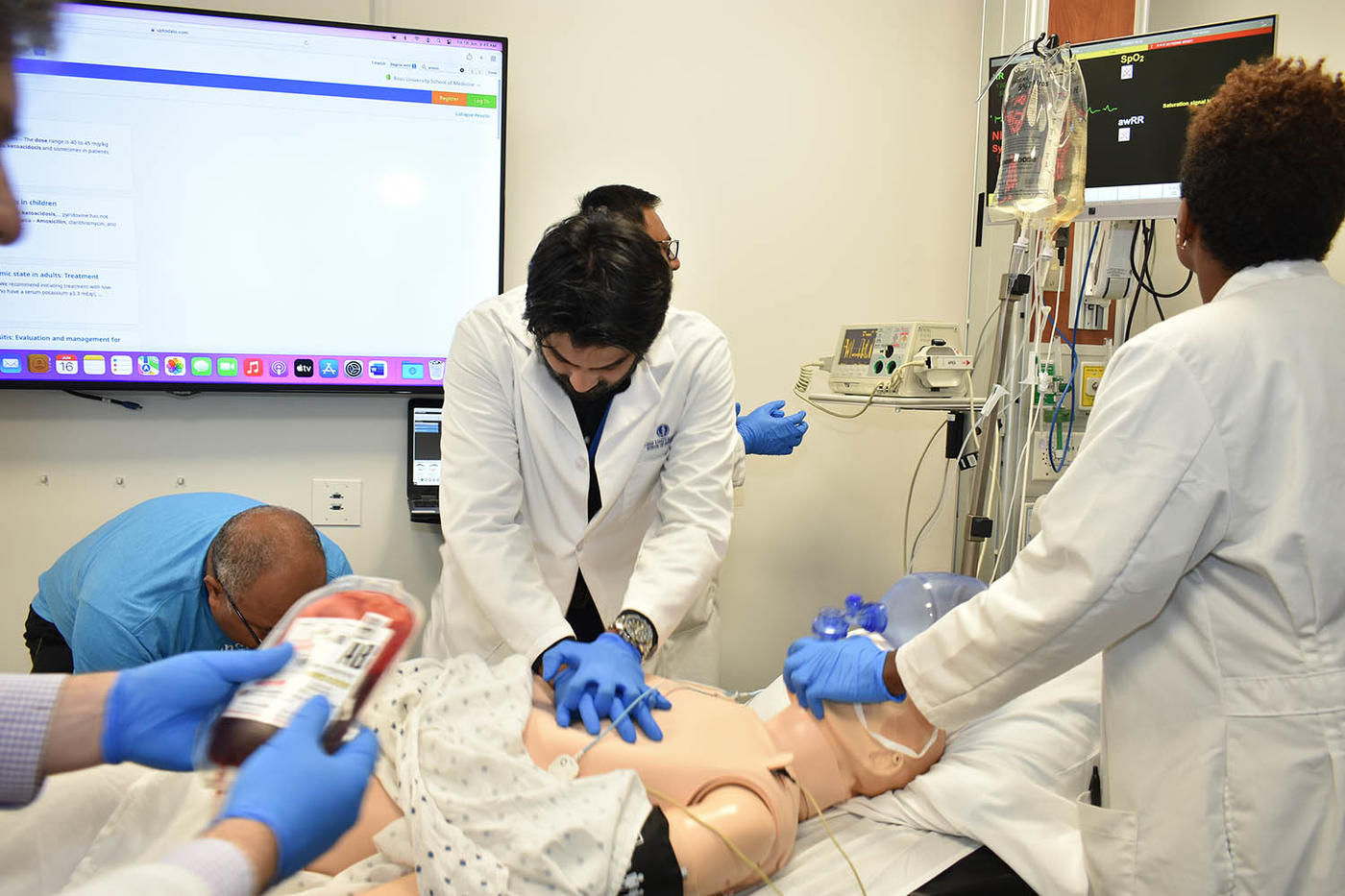
Clinical Skills
Exam Lab
Ross Med’s Clinical Skills Exam Lab emphasizes physical examination skills and incorporates the use of standardized patients. Connect your classroom learning with practical, real-world scenarios and develop the skills to deliver outpatient care with time-sensitive needs.
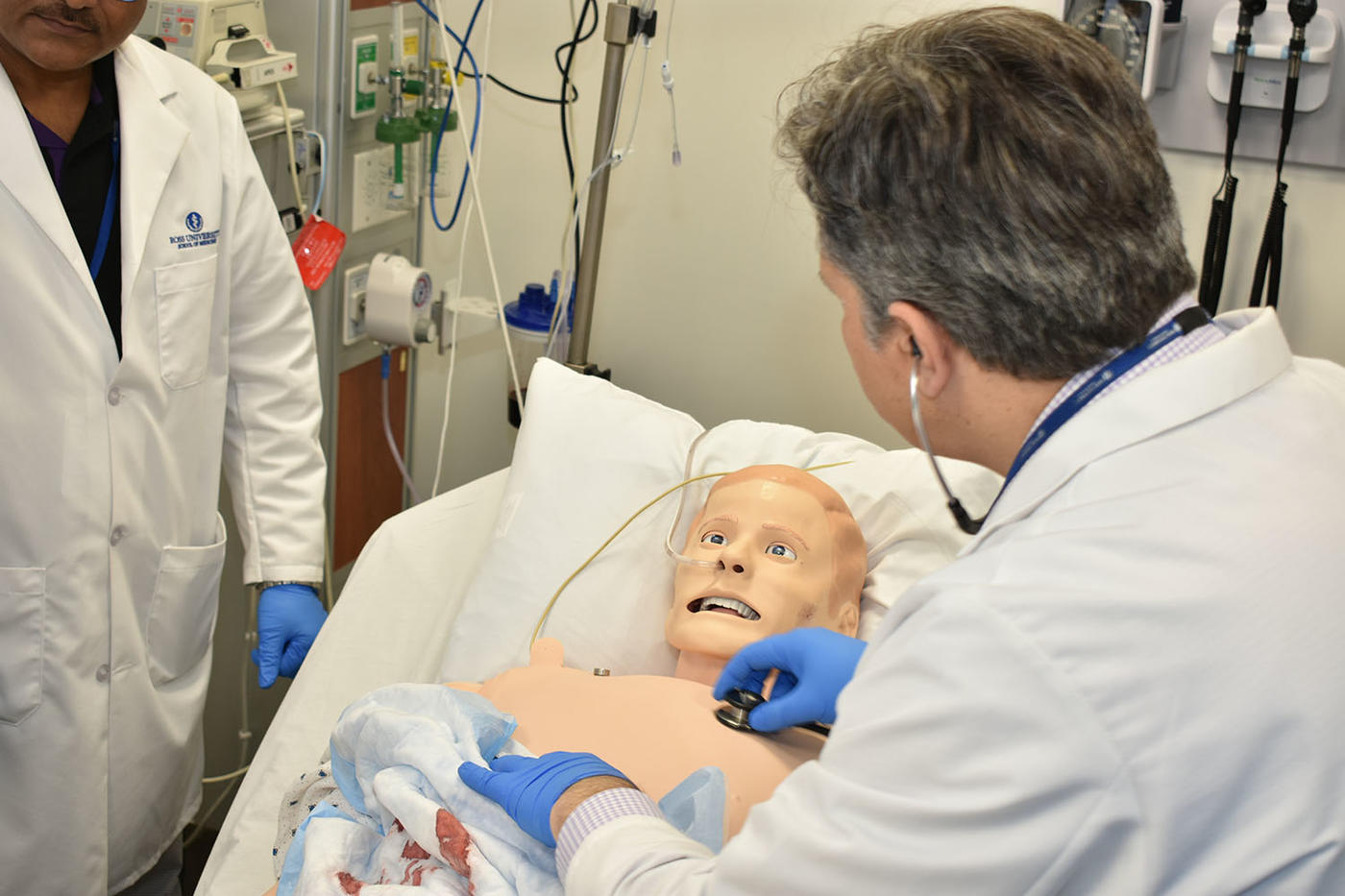
Mastering Your Skills Through Repetition
In our Clinical Skills Exam Lab, you will master patient care skills in a safe and controlled environment. By repeatedly practicing simulation scenarios with standardized patients-real individuals with a real story- you will hone your decision-making ability and increase your confidence in dealing with actual patients.
- Learn to solve problems together and develop real-world working relationships.
- Maximize your learning experience with immediate feedback and debriefing, assessment of skills, and continuous professional development.
Accreditation
Ross University School of Medicine's Simulation Institute is accredited by the Society for Simulation in Healthcare (SSH, www.ssih.org) in the areas of Teaching/Education since November 2013.
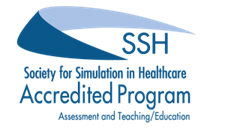
Academic Technology
As healthcare and medical training continually evolve, we continually seek ways to keep pace and anticipate challenges in the future. Ross Med’s academic technology and campus resources facilitate an active, learner-centered approach to medical education.
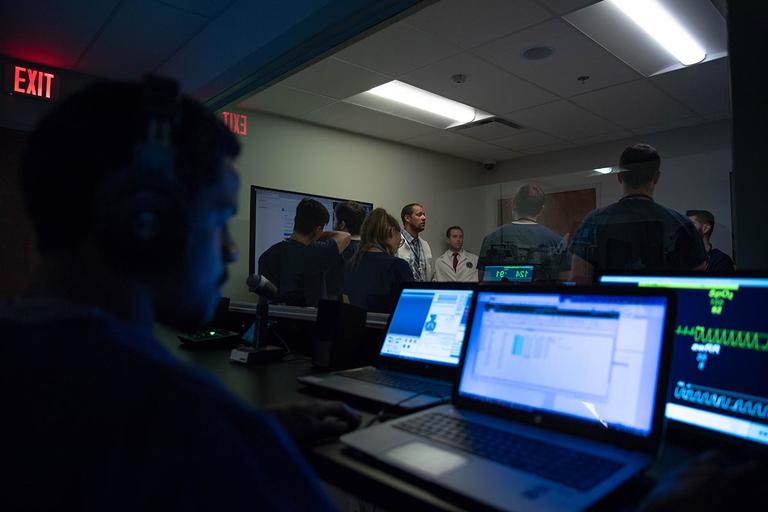
Take The Next Step
Our Medical Sciences program is designed to help you understand and address health and disease holistically.
On day one, you are welcomed into a dedicated Learning Community to support you throughout your medical school experience.
Ready to apply to Ross University School of Medicine? There are five easy ways to start your application.
